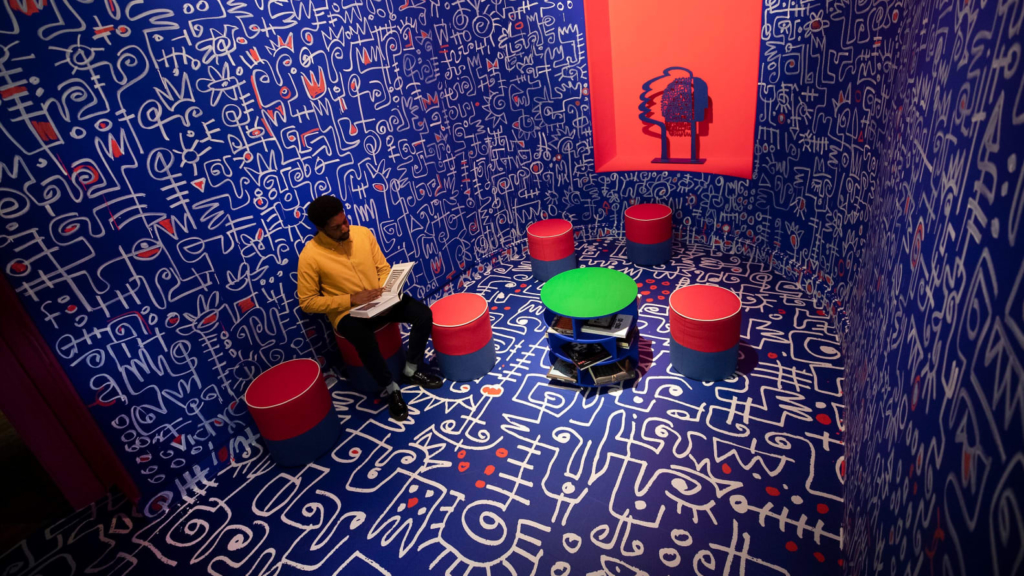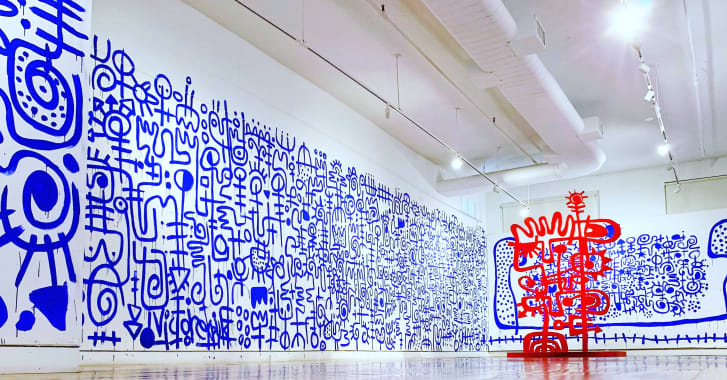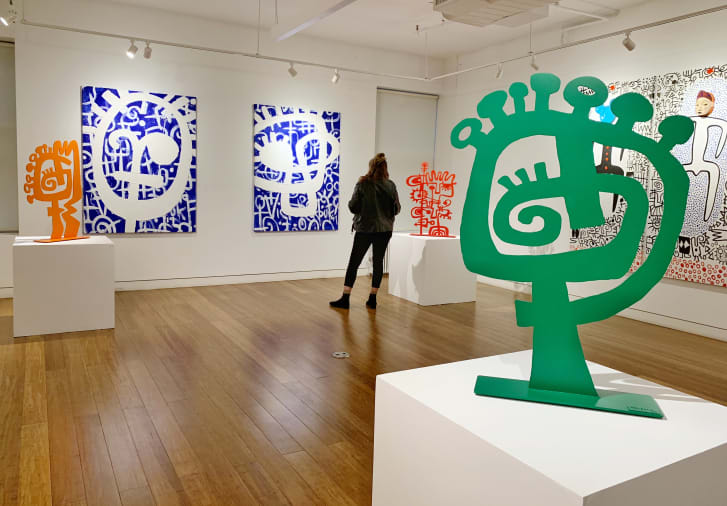On the opening day of "Get Up, Stand Up Now -- Generations of Black Creative Pioneers," lines of visitors snaked around the courtyard of London's Somerset House.
The landmark exhibition celebrates the last half-century of African diasporan artists, who have often been denied the recognition they deserve. And if the crowds are anything to go by, the acknowledgment is long overdue.
Among the more than 100 participating artists -- from across multiple disciplines and generations -- is Nigerian-American painter Victor Ekpuk.
His room-sized installation, "Shrine to Wisdom," invites visitors to sit and learn, while immersed in one of his signature murals, which is based on an ancient writing system.
CNN caught up with Ekpuk to discuss whether his afro-futuristic art pre-empted "Black Panther," and why we need more platforms to champion black creativity.

Let's talk about your new installation at Somerset House, "Shrine to Wisdom." Why did you create this mural?
Victor Ekpuk: I was contacted by Zak Ové, the curator, to contribute to the exhibition because of the nature of my work -- my large murals look at futuristic ideas of learning and knowledge.
I write these glyphs inspired by ancient writing systems in (what is now) Nigeria. They are actually knowledge-based art forms called "Nsibidi."People come into the room and feel like they are in a sacred space where they should learn something.
They're always eager to know what the symbols mean. The idea was to have an interactive space were people would walk in and be engulfed, (and) feel like they are in the womb of this knowledge. You are engulfed in entirety in writing.
What originally drew you to Nsibidi symbols?
Way back when I was in art school, there was a push for students to look closer to Nigerian traditions.
I came to Nsibidi because it's my direct tradition: I'm from Nigeria. Also its one of the earliest forms of writing or knowledge.

Do your individual glyphs all have meanings?
I'm not necessarily using the traditional symbols in my work. I've crafted my own "language," in making my own abstract marks.
There's also the sense of reducing ideas to their essence, because that's what the art form is about -- to reduce ideas or concepts to graphic symbols.
It's not like the Roman alphabet, where graphic symbols represent sounds, and when they are put together they make a word which explains a concept. In this form of writing, the graphic symbols represent ideas.
This work has been described as afro-futuristic -- would you say this is a fitting description?
Yes, it is definitely afro-futuristic. In a sense, Nsibidi themselves are afro-futuristic signs and technology.
You see it in "Black Panther' -- (in) the symbols they used in the palace and on the clothes the actors were wearing. Even bracelets had beads with inscriptions of Nsibidi and other African graphic systems.
And each of those beads were power systems that could be used as a weapon, or as a seed to create more.
"Black Panther' plays into the rethinking of the presentation of African knowledge. I was doing it before the movie. Since I left college I've been making work in that style.

With films like "Blank Panther" and exhibitions celebrating black creativity -- do you think there is a movement to rethink how African knowledge is presented?
I think so. It makes it easier for me to talk about my work. If I reference a blockbuster movie like "Black Panther," people have already seen an example of how ancient African graphic systems are used as power symbols.
It gives me an angle to talk to someone who has never experienced my culture.
It's mesmerizing to watch you drawing all over the walls in such an all-encompassing space. What's going through your mind as you create the symbols?
I'm trying to let my hands catch up with what's going on in my head at that time. It takes a lot out of me, mentally and physically.
There's only so much the physical body can do! But I do not plan ... the next mark, it just flows. I do pre-plan the concept, but when I actually arrive at the space, I don't make sketches.
What does it mean to you to be part of the "Get Up, Stand Up Now" exhibition?
It's very significant for me. I believe as an African, as somebody who grew up in non-Western society, it always seems like our voices are not being heard.
We've experienced a lot of appropriation of the ideas of African creativity, but haven't had the creators at the center.
Until now, when you talk about British art, for instance, very rarely do you see black names associated with it.
As an African in the diaspora, I share in this history of artists not being appreciated -- not because their work is not good, but because of the color of their skin.
So maybe this exhibit gives an opportunity for a dialog to begin to change. It's a conversation that's going on throughout the world. The United States is having that conversation too.
Museums in the United States are becoming more inclusive, and they're having large exhibitions of African American artists, and Africa diaspora artists, that before now have not been represented.
"Get Up, Stand Up Now -- Generations of Black Creative Pioneers" is on until Sept. 15, 2019, at London's Somerset House.
This interview has been edited for length and clarity.
Latest Stories
-
EPA says lead-based paints are dangerous to health, calls for safer alternatives
42 minutes -
Queenmother calls on President-elect Mahama to appoint more women in his government
3 hours -
Atletico Madrid beat Barcelona to go top of La Liga
3 hours -
Usyk breaks Fury’s heart with points win in rematch
3 hours -
Ghana-Russia Centre to run Russian language courses in Ghana
9 hours -
The Hidden Costs of Hunger: How food insecurity undermines mental and physical health in the U.S.
9 hours -
18plus4NDC marks 3rd anniversary with victory celebration in Accra
12 hours -
CREMA workshop highlights collaborative efforts to sustain Akata Lagoon
12 hours -
2024/25 Ghana League: Heart of Lions remain top with win over Basake Holy Stars
13 hours -
Black Queens: Nora Hauptle shares cryptic WAFCON preparation message amid future uncertainty
13 hours -
Re-declaration of parliamentary results affront to our democracy – Joyce Bawah
14 hours -
GPL 2024/25: Vision FC score late to deny Young Apostles third home win
14 hours -
Enhancing community initiatives for coastal resilience: Insights from Keta Lagoon Complex Ramsar Site Workshop
14 hours -
Family Health University College earns a Presidential Charter
14 hours -
GPL 2024/25: Bibiani GoldStars beat Nsoatreman to keep title race alive
14 hours

